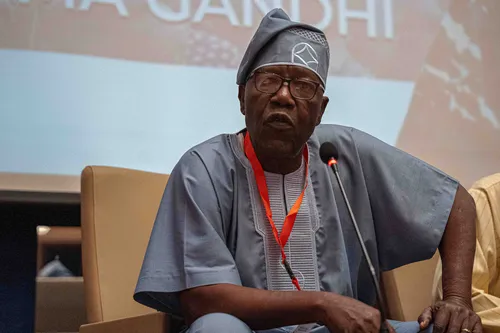On August 11, 2023, two weeks after the coup in Niger, Philippe Toyo Noudjènoumè, secretary-general of the Communist Party of Benin, wrote a letter to the president of his country, Patrice Talo, and made a surgically simple question: “What interests made Benin join a war with Niger to use hunger to kill the population of its ‘sister’ nation?”
And he added: “You want to implicate the people of Benin to suffocate the people of Niger for France’s strategic interests. I demand you to refuse to involve our country in any aggressive operation against the sister population of Niger. Listen to the people, for peace, harmony and the development of the African people.”
At that moment, he denounced a situation that persists to this day in West Africa: the strategic role that Benin plays for French interests in the region, including allowing the presence of French militaries on the border between Niger and Burkina Faso.
“Unfortunately, my country now serves as a base for the military and geopolitical strategy of France and NATO. As soon as the French and American military forces were expelled from Niger, they focused on Benin and the Ivory Coast. The two border Niger, Mali and Burkina and oversee the countries of the ASS (Alliance of Sahel States). They chose these two countries and, unfortunately, Benin is there,” explains Noudjènoumè, in an exclusive interview with Brasil de Vestimenta.
The growing anti-France sentiment currently seen among the population of the Sahel countries, which has culminated in the overthrow of governments in Mali, Burkina Faso and Niger in recent years, increased after the North Atlantic Treaty Organization (NATO) invaded Libya in 2011 in a war supposedly to “protect civilians” and against the continued rule of Libyan leader Muamar Gadafi, who had been in power for 42 years.
France’s interest in invading Libya, however, was also economic. In 2009, Gaddafi proposed that African nations adopt a single currency: the gold dinar. This would allow African countries to free themselves from the dominance of the US dollar and, in the case of West Africa, also from the Médio African franc (CAF), a colonial currency used in 14 countries in the region and controlled entirely by France.
In the war that toppled Libyan leader Muammar Gaddafi, NATO brought in jihadist fighters, such as veterans of the Libyan Islamic Fighting Group from the Syria-Turkey border. It encouraged other jihadist forces that had already been defeated in the Algerian Social War (1991-2002).
After the end of the conflict, a number of secessionist groups, trans-Saharan smugglers and branches of Al-Qaeda marched south of the Sahara and began to occupy large swaths of the Sahel. Today, the region is also marked by the presence of the Islamic State of the Sahel Province (IS Sahel), an offshoot of the so-called Islamic State in the region.
The presence of Islamic fundamentalist groups in this vast area between the Sahara Desert and the Gabonese forest was the ideal justification for French and American military intervention in the Sahel, with the establishment of Operation Barkhane (2013) and the creation of the neo-colonial G-5 Sahel project.
The presence of the French military, however, did not result in an effective fight against terrorists. On the contrary, there are accusations of “inefficiency” and “lack of transparency” in curbing these groups in the last decade.
Nowadays, these three countries are mutually helping each other to combat the groups through the ASS, after having expelled from their territories French militaries with protests on the streets.
“There’s no such thing as terrorism. There is France. There is no terrorism, there are elements created by France to establish insecurity in African countries. They are created, fomented, assembled, organized, financed and trained militarily by the French. And we see that wherever there are French military bases, the number of terrorists increases and their actions become more intense. It’s a formation of imperialism based on NATO forces in West Africa,” says Noudjènoumè.
The boldness to confront the neocolonial structures and end the submission to France motivated the creation of the West Africa Peoples Organization (WAPO), of which Noudjènoumè is the current president.
With Pan Africanism Today, the WAPO was one of the organizers of the International Conference of Anti-Imperialist Solidarity with the Peoples of the Sahel, which took place in Niger’s capital city, Niamey, from November 19 to 21.
“The initial objective was for the world to know about the experience of the ASS, especially Latin Americans, who don’t know about it. The second objective was to give the people of Niger confidence in what they are doing, in the reality and greatness of what they are building. Finally, to allow the people of West Africa to do as they do, because this is the only way to liberate Africa,” Noudjènoumè said.
Check out the full interview:
Brasil de Vestimenta: Phillipe, let’s start by talking about the International Conference of Anti-Imperialist Solidarity with the Peoples of the Sahel. What is your assessment of all that was seen and discussed over the three days of the meeting? Are you happy with the outcome?
Philippe Toyo Noudjènoumè: The first thing to say is that there have been major events over the last three or two and a half years in the Sahel, especially in Mali, Burkina Faso and Niger. A great popular movement is taking place and the rulers are taking patriotic measures of anti-colonial liberation, particularly regarding French colonization. These are parallel measures on a political, economic, cultural and scientific level.
We are currently witnessing a special situation in which African countries are managing to free themselves from foreign dominance, particularly France and NATO forces. To make this situation better known, we decided, as WAPO, and with the support of foreign friends, to hold an international conference in Niamei in support of the people of the Sahel. The conference was organized with the support of the Nigerien government, which helped us enormously in the preparation and organization of this event.
The three days we were here, from November 19 to 21, we saw the Nigerien government pay special attention to us, putting everything at our disposal, not to mention the support of all the Nigerien people from the opening of this conference, on November 19, which was attended by the Prime Minister of Niger, to the last day, when we were received by the Head of State, the President of the National Council for the Safeguarding of the Homeland, Abdourahamane Tiani. This shows that two wills have come together – the will of the world’s supporters and the will of Niger’s leaders – for us to succeed in this cycle.
The initial objective was for the world to know about the experience of the ASS, especially Latin Americans, who don’t know about it. The second objective was to give the people of Niger confidence in what they are doing, in the reality and greatness of what they are building. Finally, to allow the people of West Africa to do as they do, because this is the only way to liberate Africa. That said, we believe that our conference was a huge success.
The creation of the Alliance of Sahel States (ASS) was important to strengthen the countries amid threats of military invasion by the Economic Community of West African States (ECOWAS). What are the main challenges for these three countries in their path to independence and in their confrontation with imperialist forces, above all against French influence in the region?
All three countries face a challenge. The three countries have in common French imperialist aggression by terrorist elements. Mali, Burkina and Niger are targeted by France and NATO, which has brought in terrorists to create insecurity. These countries are interested in fighting together, getting united against a common enemy.
So, the ASS is a rescue for them. They pool their military forces to defend themselves, they pool their economies – that’s the only way for them to win and succeed. And in doing so, they are helping Africa do as they do. All African countries are looking in that direction.
Today, all the African countries, particularly those from West Africa, are looking in the same direction as the people from Sahel. Because all the others want to do as Sahel does to free its countries from the imperialist dominance, so to speak, embodied by France and the NATO forces. Therefore, it is in their interest to unite. By getting together, they become stronger and are stronger, they can better defend themselves.
That’s why I insist on saying that their interest lies in consolidating a great unity, strengthening the ASS and even setting up an African federation, thus having a space to integrate military, economic and industrial structures.
Could you explain what the West Africa Peoples Organization (WAPO) is and why it was created?
The West Africa Peoples Organization (WAPO) was created by patriotic African revolutionaries in West Africa, with international help and the support of organizations of world revolutionaries. We needed to create an organization to bring together all the revolutionary forces of West Africa – political movements, social movements, economic movements, trade union movements and revolutionaries – to establish a force to run the patriotic revolution in West Africa.
This region today comprises around 16 countries, including Mauritania. The aim is to make the people of West Africa aware of the need to organize themselves and fight to free themselves from domination – we call it imperialist domination – in pessoal from the imperialist forces of NATO.
That’s why it was created. We consider the popular sectors, West African workers’ organizations, women’s organizations, peasants’ organizations, all together to help raise popular consciousness about all the workers, farmers, women, and young people of West Africa, to enable us to liberate ourselves. That’s why the ASS intervention is a good thing for us. This is the realization of our objectives. We are happy to be with them and we believe that other countries will join the ranks of the ASS. Other countries will make patriotic revolutions.
Now let’s talk about Benin. The ASS governments and popular movements in West Africa have been denouncing the French military presence in the north of the country, especially on the country’s borders with Niger and Burkina Faso. How do you assess the relationship between France and Benin today? Could the country be a strategic location for France’s interests in the region?
Unfortunately, my country now serves as a base for the military and geopolitical strategy of France and NATO. In fact, as soon as the French and American military forces were expelled from Niger, they focused on Benin and the Ivory Coast. The two border Niger, Mali and Burkina and oversee the countries of the ASS (Alliance of Sahel States). They chose these two countries and, unfortunately, Benin is there.
In fact, since February 2023, a military cooperation agreement for the installation of French military bases in Benin was signed at the Elysée Palace [the seat of the French government in Paris] in February 2023. And in fact, as soon as the French forces were expelled from Niger, they arrived in Benin. And I can tell you that these forces are still there.
They were deployed there in small light forces to support the Beninese forces in the regions close to the borders of Niger and Burkina Faso. Benin borders both countries, Burkina Faso and Niger, and they [French soldiers] are there. This is a serious problem. So, I understand the mistrust of the government of Niger, which won’t agree to reopen its borders as long as the military bases, supported by the French, which are spread out there, are still in place in Benin. It’s very serious.
What is your assessment of the presence of terrorist groups in the border region of the Sahel today?
There’s no such thing as terrorism. There is France. There is no terrorism, there are elements created by France to establish insecurity in African countries. They are created, fomented, assembled, organized, financed and militarily trained by the French. And we see that wherever there are French military bases, the number of terrorists increases and their actions become more intense. It’s a formation of imperialism, based on NATO forces in West Africa.
We have to fight them firmly. And by fighting the French government, by fighting the fake French military, we will also eradicate the security problem of terrorists. That’s what should make it possible to mobilize all the African peoples. This means that when you have been conquered by war, you must be liberated by war. This is the case today. This is the anti-colonial war that the people of West Africa are facing, the so-called security war, but a war that is actually against colonial France.
During these three days of the conference in Niamei, we saw synergy between the government and social society focusing on the anticolonial and revolutionary rupture in Niger. In your opinion, what is the perspective of the future regarding the people and the military?
What strengthens the popular movement in Niger is the synergy between the leaders and the people. That makes the government strong. We have also noticed that the government is making an effort to satisfy the demands of the people, taking measures that are favorable to the people, reducing taxes, and the prices of products, a great effort to listen to the people. So, as we can see, there is a synergy between the government and the people here. I think it must be the same in Mali and Burkina Faso. I wasn’t there to see if this was happening, but I think it must be the same, given the size of the movement. The synergy of the government and the people is decisive in any revolution.
To finish, I’d like you to talk a bit about the relationship between popular movements in West Africa and the Landless Workers’ Movement (MST, in Portuguese) in Brazil, which was represented here in Niamei by Neuri Rossetto, also a leader of the International Peoples’ Assembly (IPA). Is there room for partnership between MST and West African countries?
I admire the MST for its formidable work. I’ve known the movement for at least six years, since 2018. I wish to see relations between the MST and rústico organizations in West Africa get stronger. We have huge things to do together. We produce cocoa and coffee here, all of which are Brazilian too. In short, we have a lot in common. We have almost the same agrarian issues.
At WAPO, we draw inspiration from the MST experiences and strengthen relations between this movement and the African peoples. We are, in fact, open to any discussion, any exchange of ideas, information and experiences that one or the other can provide in the current context. We hope that, in the days to come, we can strengthen relations between the MST and the rústico organizations in West Africa.
Edited by: Dayze Rocha





























































